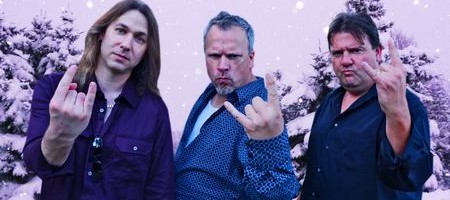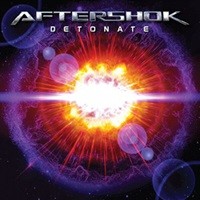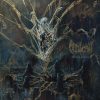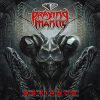Aftershok – Return to Detonate Part I
Wednesday, 22nd June 2016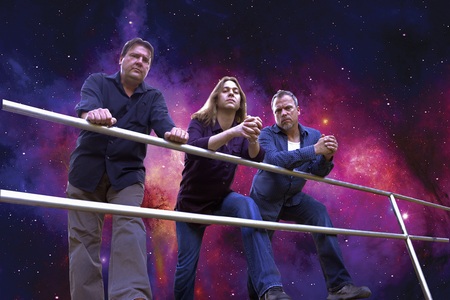
Being away from the recording front for over a decade would normally be a daunting task to return to a metal scene – especially one that in the interim has progressed infinitely in the direction of more digital releases, lower physical sales, and a quick burn on the promotional front as audiences move quicker than ever in their taste making. Guitarist George Mihalovich of the more traditional / classic metal oriented Aftershok knows this all too well. Which makes the third album Detonate very special – as the band’s return not only comes with a new singer that will turn heads in Gord Sheffroth, but is backed up by a strong set of songs, production, and proper packaging for those still committed to owning physical products.
If names like Dio, Riot, Saxon, and Savatage mean anything to your life, then Aftershok’s blend of catchy, straight ahead riffing and powerhouse hooks/ melodies will be right in your aural wheelhouse. Seeking out George by phone we were able to touch on a number of topics from their prolonged absence to his experience playing with Shok Paris in Germany, as well as his thoughts on navigating the changing metal consumption model from both the recording fronts and the pure fan landscape. Aftershok offers hope in a US scene that the heart of 80’s metal can still be relevant in today’s scene – it’s all in how you execute and present the songs to the public.
Dead Rhetoric: Detonate is the third Aftershok album and first in 11 years. An obvious first question would be: what took so long between records? I’d imagine finding the right singer to replace Vic Hix (ex-Shok Paris) would be one of the factors, but what else took place in the interim and did you ever worry if Aftershok would continue?
George Mihalovich: There were a variety of things. After we did Burning Chrome, we did some promotion and we had a pretty good run of 5-6 years writing material, recording, doing gigs, rehearsing material. And then as it can life started to creep up on some members of the band- family responsibilities, and we had to use a different bassist for a few different gigs. Our original bassist came back, then our drummer was in and out of the band a few times. We went through a period of 2-3 years after Burning Chrome with this, Vic was getting frustrated. That’s when he decided he needed a break from this, and he didn’t want to do music at this time.
So at one point, I hate to think of the time line because it’s hard for me to believe it’s been 11 years at this point, I was the only thing left of Aftershok. I even considered changing the name, but I still had the concept for the band and where I wanted it to go. Vic and I were the main writers and sort of drove the ship, and I still felt like I knew what I wanted to do it was just a matter of finding the way to do it. Again I auditioned different people while writing songs, I just couldn’t get the right combination. Finally, (drummer) George Borden reached out to me, he came into the fold and we have a long standing relationship so it’s very easy for me to work with him. He was already familiar with a lot of the material I wanted to use, so for now I wanted to keep things simple and have it be a recording project for the time being. I ended up playing bass, I wanted to get these songs down, get the arrangements done, get his drum parts on there and I would take care of the rest.
I looked for the singer while we get the music together. The studio moved so that caused delays, then we had to schedule around my work, George’s work, the engineer’s other projects. Once we got everything ready it took 3 years to find the right singer. After we got Gord on board it took a couple of years to learn how to do this across the borders. Working with someone new in the studio is one thing, but having to do remote recording and sending the tracks back, dropping them in and evaluating them was really different. It was a learning curve for both of us. Over the past year we put the finishing touches on things, we wanted to make sure everything was right- it had been a while, and we wanted to make sure that we could come back and make some noise.
Dead Rhetoric: Gord Sheffroth from Canada is the new singer – but I’ve heard that there was a fairly long list of singers under consideration, so what made him standout to you? Were there any particular notably names you considered putting in that slot – or did you consider possibly going down the series of guest vocal route?
Mihalovch: I briefly thought about the guest vocal route a few times, but really… and no disrespect to anyone that does those albums, as I own a lot of them, I feel for most fans they connect better with a singer that has a consistency throughout the band. I did talk to some known guys as well as some unknown guys that might have been interested in doing this because of the project, or more like a hired gun. Gord brought a couple of things to the table- he had an incredible way of interpreting the material, great vocal tracks working on this material on his own at home. He had versatility in his voice that I was looking for. The ability to bring a lot of different things to the music. The bonus was the fact that he is a phenomenal vocalist and he is easy to work with- plus he is a fan of what I do. He really wants to be involved and loves what we are doing. That’s a big bonus.
Dead Rhetoric: How long did the songwriting and recording actually take for this new record? What challenges did Aftershok have to work through, and do you believe working with another stellar guitarist behind the boards in Jim Dofka gave you the extra set of critical ears to step up your game in terms of the performances?
Mihalovich: Jim was involved from day one, but he moved his studio after we completed tracking the drums- so it took a while for us to adjust to that, as well as him upgrading his equipment. Gord flew down here to Pennsylvania to record two tracks two summers ago- the rest of the vocals he did in his home studio. So that was the big thing- there were some challenges because he’s a good engineer in terms of home recording but not in the sense of a regular recording engineer- so there was a lot of back and forth between both of us to understand how to get the best sounding tracks that would work really well and not require a lot of massaging in the studio.
As far as Jim Dofka and I go, he’s a fantastic guitarist and he and I have known each other for a long while as a producer and engineer. He knew what I was after, and it was a big help having those critical ears. It led to some differences of opinion, but it was essential to get where the record needed to be. I’m always writing – writers write. I was always working on material, we just reached a point where we had a group of songs and we whittled it down until we got the group of songs that we wanted. I have a back log of material now that I hope will become the next record.
Pages: 1 2











